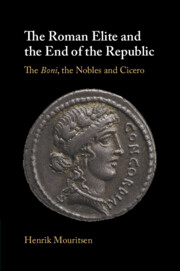Book contents
- The Roman Elite and the End of the Republic
- The Roman Elite and the End of the Republic
- Copyright page
- Contents
- Acknowledgements
- Introduction
- Part I The Boni in the Late Republic
- Part II Property and Politics
- Chapter 6 Wealth and Morality Revisited
- Chapter 7 Boni
- Chapter 8 Boni and Improbi
- Chapter 9 Otium and Tranquillitas
- Chapter 10 Vita et Bona
- Chapter 11 The Road to Perdition
- Chapter 12 ‘Egentes Sumptuosi Nobiles’
- Part III The Boni and the End of the Republic
- Appendices
- Bibliography
- Index
Chapter 10 - Vita et Bona
Property and Security
from Part II - Property and Politics
Published online by Cambridge University Press: 15 December 2022
- The Roman Elite and the End of the Republic
- The Roman Elite and the End of the Republic
- Copyright page
- Contents
- Acknowledgements
- Introduction
- Part I The Boni in the Late Republic
- Part II Property and Politics
- Chapter 6 Wealth and Morality Revisited
- Chapter 7 Boni
- Chapter 8 Boni and Improbi
- Chapter 9 Otium and Tranquillitas
- Chapter 10 Vita et Bona
- Chapter 11 The Road to Perdition
- Chapter 12 ‘Egentes Sumptuosi Nobiles’
- Part III The Boni and the End of the Republic
- Appendices
- Bibliography
- Index
Summary
Otium was more than a general sense of comfort; it carried an almost existential quality of ‘security’ that brought it semantically close to salus. The two concepts were, as we saw, often paired, hinting at the profound nature of the underlying concerns. Indeed, Roman public life could, as Cicero did in the Pro Milone, be conceptualised as a perpetual fight ‘for the salus of the boni against the madness of desperate men’.1 And an official senatorial decree calling for Cicero’s restoration had apparently stated that any obstruction would be ‘contrary to the res publica, to the salus of the boni and to the concord of the citizens’.2 Salus represented personal security in the broadest sense of life, possessions and social standing, and while the boni may have taken little interest in day-to-day politics, they did of course care very much about their personal welfare and prosperity. Attempts at engaging them therefore focused on these concerns, repeatedly warning of threats to their ‘salus et otium’. The key passage of Cicero’s second agrarian speech, quoted above, listed the most important benefits of otium, and as its final crowning reward he placed the protection of the family fortune, which rested on pax, ‘res familaris in pace’; for that reason, Cicero stressed that: ‘you ought to preserve otium by all means’.3
- Type
- Chapter
- Information
- The Roman Elite and the End of the RepublicThe <i>Boni</i>, the Nobles and Cicero, pp. 142 - 162Publisher: Cambridge University PressPrint publication year: 2022

